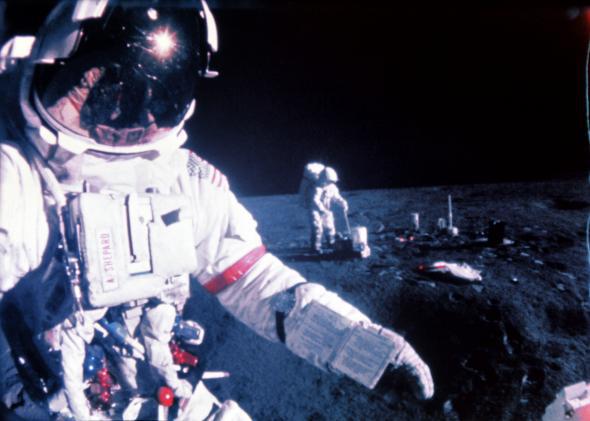Another year, another round of budget woes for NASA. The recent two-year budget agreement eases but doesn’t eliminate worries about sequestration’s stranglehold, and NASA will suffer, especially when it comes to planetary science. Once again, advocates of space exploration face the daunting challenge of devising compelling arguments to justify spending money on space despite pressing needs on Earth, which raises the question of how to convince politicians and the public that space is a worthwhile investment. The past holds the answer: Space advocates should leverage competition between countries and companies.
In 1962 Kennedy delivered the first widely resonant pro-space argument. While he resorted to some manipulation and fear-mongering by exploiting Cold War boogeymen, his rhetoric worked. NASA’s budget doubled between 1962 and 1963, and quadrupled between 1962 and 1966. Kennedy warned that space expenditures would rise 25 percent per week per person, but convinced people that safety and victory were worth it.
After the 1969 moon landing, Carl Sagan merged pro-space rhetoric with philosophy, extolling the virtues of the perspective and humility space exploration brings. While it may be true that exploration promotes “cultural exuberance” and has always been a hallmark of humanity, even Sagan’s mentee Neil deGrasse Tyson admits those arguments are “tired” and appeal only to people who already value space exploration. Ideally, philosophical arguments would move the masses, but they suffer from a lack of urgency. Even arguments about the practical earthly benefits of space knowledge and technology lack grist. They don’t answer the questions of why we should invest in space, and why now.
While the ISS symbolizes international collaboration (as do the Russian Soyuz capsules NASA uses to get American astronauts there), competition between countries could renew interest in space. China recently landed a rover on the moon and launched the Tiangong 1 space laboratory; it plans to land a rover on Mars and to get people on Mars as early as 2040. The red planet may be the destination of the next space race, especially given that America’s biggest space competitor is another Communist country with which it marches toward something akin to a Cold War. Kennedy’s overtness seems inappropriate today, but countries can compete without fostering hostility or hatred. Preserving diplomacy should take precedence—Kennedy demonstrates how powerful single words such as “first” can be. He admitted that the United States was behind in the space race and hammered home the unacceptability of that status quo. Why not use a similar argument to galvanize America now?
A less delicate competition to exploit is that between private companies. Space tourism will make low-Earth orbit accessible to those who can buy tickets in the next year or so, which will generate press (including Lady Gaga’s planned performance in space), stories, and a new market. Space X regularly develops innovations such as reusable rockets and was the first commercial space company to dock a ship with the ISS, indicating a growing commercial market for cargo transport to space stations. Space X also nabbed a contract from Ariane 5, the European Space Agency’s rocket launch system, to deliver commercial satellites into space, which it did for the first time in November. Private companies can build rockets at less than half of NASA’s costs, and raising awareness that taxes and government spending aren’t the only ways to explore space may help erode current resistance. Space advocates can unite capitalism and space exploration—bargains and a new economy-boosting industry will make politicians and the masses happy.
Tyson argues that space frontiers must be led by governments, much like Columbus’ journey to the Americas. But frontier missions only need to be funded once—after a government mission reaches a target, private companies can compete for business. Thus, competition could increase the return on NASA investments, creating a universally beneficial relationship, as well as new opportunities to pivot back to collaboration with a renewed sense of purpose. Governments can also choose to focus on historical, high-stakes endeavors (Mars colonization, for example) that people may not entrust to private companies, making it easier to garner support for those missions.
While it may feel indecorous to leverage capitalism over curiosity, space isn’t just an infinite expanse—it’s also a business. Space advocates need to make arguments that move politicians and average people, not just stargazers. The end justifies the means—any rhetoric is good rhetoric, as long as it gets us into the cosmos.
